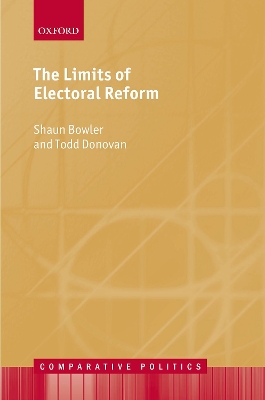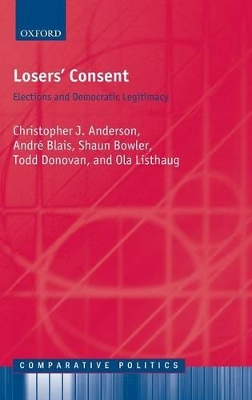Comparative Politics
2 total works
Institutions 'matter' to electoral reform advocates and political scientists - both argue that variation in electoral institutions affect how elected officials and citizens behave. Change the rules, and citizen engagement with politics can be renewed. Yet a look at the record of electoral reform reveals a string of disappointments. This book examines a variety of reforms, including campaign finance, direct democracy, legislative term limits, and changes to the
electoral system itself. This study finds electoral reforms have limited, and in many cases, no effects. Despite reform advocates' claims, and contrary to the 'institutions matter' literature, findings here suggest there are hard limits to effects of electoral reform. The explanations for this are
threefold. The first is political. Reformers exaggerate claims about transformative effects of new electoral rules, yet their goal may simply be to maximize their partisan advantage. The second is empirical. Cross-sectional comparative research demonstrates that variation in electoral institutions corresponds with different patterns of political attitudes and behaviour. But this method cannot assess what happens when rules are changed. Using examples from the US, UK, New Zealand, Australia,
and elsewhere this book examines attitudes and behaviour across time where rules were changed. Results do not match expectations from the institutional literature. Third is a point of logic. There is an inflated sense of the effects of institutions generally, and of electoral institutions in
particular. Given the larger social and economic forces at play, it is unrealistic to expect that changes in electoral arrangements will have substantial effects on political engagement or on how people view politics and politicians. Institutional reform is an almost constant part of the political agenda in democratic societies. Someone, somewhere, always has a proposal not just to change the workings of the system but to reform it. The book is about how and why such reforms disappoint.
Comparative Politics is a series for students, teachers, and researchers of political science that deals with contemporary government and politics. Global in scope, books in the series are characterised by a stress on comparative analysis and strong methodological rigour. The series is published in association with the European Consortium for Political Research. For more information visit: www.ecprnet.eu. The Comparative Politics series is edited by Professor David M. Farrell,
School of Politics and International Relations, University College Dublin, and Kenneth Carty, Professor of Political Science, University of British Columbia.
electoral system itself. This study finds electoral reforms have limited, and in many cases, no effects. Despite reform advocates' claims, and contrary to the 'institutions matter' literature, findings here suggest there are hard limits to effects of electoral reform. The explanations for this are
threefold. The first is political. Reformers exaggerate claims about transformative effects of new electoral rules, yet their goal may simply be to maximize their partisan advantage. The second is empirical. Cross-sectional comparative research demonstrates that variation in electoral institutions corresponds with different patterns of political attitudes and behaviour. But this method cannot assess what happens when rules are changed. Using examples from the US, UK, New Zealand, Australia,
and elsewhere this book examines attitudes and behaviour across time where rules were changed. Results do not match expectations from the institutional literature. Third is a point of logic. There is an inflated sense of the effects of institutions generally, and of electoral institutions in
particular. Given the larger social and economic forces at play, it is unrealistic to expect that changes in electoral arrangements will have substantial effects on political engagement or on how people view politics and politicians. Institutional reform is an almost constant part of the political agenda in democratic societies. Someone, somewhere, always has a proposal not just to change the workings of the system but to reform it. The book is about how and why such reforms disappoint.
Comparative Politics is a series for students, teachers, and researchers of political science that deals with contemporary government and politics. Global in scope, books in the series are characterised by a stress on comparative analysis and strong methodological rigour. The series is published in association with the European Consortium for Political Research. For more information visit: www.ecprnet.eu. The Comparative Politics series is edited by Professor David M. Farrell,
School of Politics and International Relations, University College Dublin, and Kenneth Carty, Professor of Political Science, University of British Columbia.
Losers' Consent
by Christopher J. Anderson, Andre Blais, Shaun Bowler, Todd Donovan, and Ola Listhaug
Published 1 January 2005
Democratic elections are designed to create unequal outcomes: for some to win, others have to lose. This book examines the consequences of this inequality for the legitimacy of democratic political institutions and systems. Using survey data collected in democracies around the globe, the authors argue that losing generates ambivalent attitudes towards political authorities. Because the efficacy and ultimately the survival of democratic regimes can be seriously
threatened if the losers do not consent to their loss, the central themes of this book focus on losing: how losers respond to their loss and how institutions shape losing. While there tends to be a gap in support for the political system between winners and losers, it is not ubiquitous. The book paints
a picture of losers' consent that portrays losers as political actors whose experience and whose incentives to accept defeat are shaped both by who they are as individuals as well as the political environment in which loss is given meaning.
Given that the winner-loser gap in legitimacy is a persistent feature of democratic politics, the findings presented in this book contain crucial implications for our understanding of the functioning and stability of democracies.
threatened if the losers do not consent to their loss, the central themes of this book focus on losing: how losers respond to their loss and how institutions shape losing. While there tends to be a gap in support for the political system between winners and losers, it is not ubiquitous. The book paints
a picture of losers' consent that portrays losers as political actors whose experience and whose incentives to accept defeat are shaped both by who they are as individuals as well as the political environment in which loss is given meaning.
Given that the winner-loser gap in legitimacy is a persistent feature of democratic politics, the findings presented in this book contain crucial implications for our understanding of the functioning and stability of democracies.

